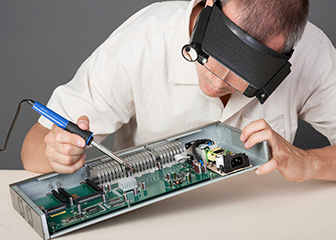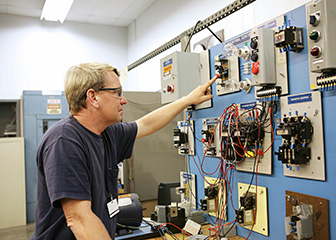Electrical or Electronics Installer and Repairer
Electrical or Electronics Installer and Repairer
Does this career fit your work personality?
Begin The Career Assessment Test- Best Fitting Careers
- Work Personality Strengths
- Work Style Preferences
- and more
What Electrical and Electronics Installers and Repairers Do
Electrical and electronics installers and repairers install or repair a variety of electrical equipment in transportation, utilities, and other industries.
Duties
Electrical and electronics installers and repairers typically do the following:
- Discuss problems and requirements with customers
- Inspect and test equipment
- Reproduce, isolate, and diagnose problems
- Disassemble equipment as necessary to access problematic components
- Clean, repair, and replace components
- Reassemble and test equipment after repairs
- Keep records of repairs, tests, parts, and labor hours
Modern manufacturing plants and transportation systems use a large amount of electrical and electronics equipment, from assembly line motors to sonar systems. Electrical and electronics installers and repairers fix and maintain these complex pieces of equipment.
Because automated electronic control systems are becoming more complex, repairers use software programs and testing equipment to diagnose malfunctions. Among their diagnostic tools are multimeters—which measure voltage, current, and resistance—and advanced multimeters, which measure the capacitance, inductance, and current gain of transistors.
Repairers also use signal generators, which provide test signals, and oscilloscopes, which display signals graphically. In addition, repairers often use hand tools such as pliers, screwdrivers, and wrenches to replace faulty parts and adjust equipment.
The following are examples of types of electrical and electronics installers and repairers:
Commercial and industrial electrical and electronics equipment repairers adjust, test, repair, or install electronic equipment, such as industrial controls, transmitters, and antennas.
Electric motor, power tool, and related repairers—such as armature winders, generator mechanics, and electric golf cart repairers—specialize in installing, maintaining, and repairing electric motors, wiring, or switches.
Electrical and electronics installers and repairers of transportation equipment install, adjust, or maintain mobile communication equipment, including sound, sonar, security, navigation, and surveillance systems on trains, watercraft, or other vehicles.
Electronic equipment installers and repairers of motor vehicles install, diagnose, and repair sound, security, and navigation equipment in motor vehicles. These installers and repairers work with a range of complex electronic equipment, including digital audio and video players, navigation systems, and passive and active security systems.
Powerhouse, substation, and relay electrical and electronics repairers inspect, test, maintain, or repair electrical equipment used in generating stations, substations, and in-service relays. These workers also may be known as powerhouse electricians, relay technicians, or power transformer repairers.
Work Environment

Electrical and electronics installers and repairers held about 113,300 jobs in 2022. Employment in the detailed occupations that make up electrical and electronics installers and repairers was distributed as follows:
| Electrical and electronics repairers, commercial and industrial equipment | 53,600 |
| Electrical and electronics repairers, powerhouse, substation, and relay | 26,100 |
| Electric motor, power tool, and related repairers | 16,100 |
| Electronic equipment installers and repairers, motor vehicles | 9,700 |
| Electrical and electronics installers and repairers, transportation equipment | 7,900 |
The largest employers of electrical and electronics installers and repairers were as follows:
| Manufacturing | 16% |
| Utilities | 15 |
| Wholesale trade | 10 |
| Repair and maintenance | 9 |
| Federal government, excluding postal service | 8 |
Many electrical and electronics installers and repairers work in repair shops or in factories, and some may work outside when they travel to job sites.
Installers and repairers may have to lift heavy equipment and work in awkward positions. They spend most of their day walking, standing, or kneeling.
Work Schedules
The majority of electrical and electronics installers and repairers work full time.
Getting Started
How to Become an Electrical or Electronics Installer and Repairer

Electrical and electronics installers and repairers need at least a high school education, but most specializations require further preparation through advanced education, work experience, or both.
Education
Electrical and electronics installers and repairers must understand electrical equipment and electronics. As a result, employers often prefer applicants who have taken courses in electronics at a community college or technical school. Courses usually cover AC and DC electronics, electronic devices, and microcontrollers. It is important for prospects to choose schools that include hands-on training in order to gain practical experience.
Training
In addition to technical education, workers usually receive training on specific types of equipment. This may involve manufacturer-specific training for repairers who will perform warranty work.
Before working independently, entry-level repairers usually develop their skills while working with experienced technicians who provide technical guidance.
Work Experience in a Related Occupation
Some electrical and electronics installers and repairers need prior work experience. Electric motor, power tool, and related repairers typically begin by helping in machine or electrical workshops, where they gain experience with tools and motors.
Powerhouse, substation, and relay electrical and electronics repairers often gain experience by first working as electricians.
Licenses, Certifications, and Registrations
While certification is not required, a number of organizations offer it, and it can be useful in getting a job. For example, the Electronics Technicians Association International (ETA International) offers more than 50 certification programs in numerous electronics specialties for various levels of competency. The International Society of Certified Electronics Technicians (ISCET) also offers certification for several levels of competence. The ISCET focuses on a broad range of topics, including basic electronics, electronic systems, and appliance service. To become certified, applicants must meet prerequisites and pass a comprehensive exam.
Job Outlook
Overall employment of electrical and electronics installers and repairers is projected to decline 2 percent from 2022 to 2032.
Despite declining employment, about 9,100 openings for electrical and electronics installers and repairers are projected each year, on average, over the decade. All of those openings are expected to result from the need to replace workers who transfer to other occupations or exit the labor force, such as to retire.
Employment
Projected employment of electrical and electronics installers and repairers varies by occupation (see table).
Over the projections decade, improvements in electrical and electronics equipment design and increased use of disposable tool parts are expected to dampen the need for electrical and electronics equipment installers and repairers.
Upgrades to transportation electronics systems, such as those on trains, buses, and ships, will support some demand for installers and repairers of this equipment.
Motor vehicle manufacturers continue to install and integrate high-quality sound, security, entertainment, and navigation systems in new vehicles. In addition, smartphones offer many features previously installed directly in vehicles. These consumer offerings reduce demand for installing aftermarket products and for repairing high-quality systems, which is expected to limit the need for electrical and electronics installers and repairers.
Contacts for More Information
For more information about electrical and electronics installers and repairers, including careers and certification, visit
Similar Occupations
This table shows a list of occupations with job duties that are similar to those of electrical and electronics installers and repairers.
| Occupation | Job Duties | Entry-Level Education | Median Annual Pay, May 2022 | |
|---|---|---|---|---|

|
Electricians |
Electricians install, maintain, and repair electrical power, communications, lighting, and control systems. |
High school diploma or equivalent | $60,240 |

|
Aircraft and Avionics Equipment Mechanics and Technicians |
Aircraft and avionics equipment mechanics and technicians repair and perform scheduled maintenance on aircraft. |
See How to Become One | $70,740 |

|
Telecommunications Technicians |
Telecommunications technicians install, maintain, and repair radio, internet, and other telecommunications infrastructure. |
See How to Become One | $60,190 |

|
Elevator and Escalator Installers and Repairers |
Elevator and escalator installers and repairers install, maintain, and fix elevators, escalators, moving walkways, and other lifts. |
High school diploma or equivalent | $99,000 |

|
General Maintenance and Repair Workers |
General maintenance and repair workers fix and maintain machines, mechanical equipment, and buildings. |
High school diploma or equivalent | $44,980 |

|
Electrical and Electronics Engineers |
Electrical engineers design, develop, test, and supervise the manufacture of electrical equipment. |
Bachelor's degree | $104,610 |

|
Electrical and Electronic Engineering Technologists and Technicians |
Electrical and electronic engineering technologists and technicians help engineers design and develop equipment that is powered by electricity or electric current. |
Associate's degree | $66,390 |

|
Industrial Machinery Mechanics, Machinery Maintenance Workers, and Millwrights |
Industrial machinery mechanics, machinery maintenance workers, and millwrights install, maintain, and repair factory equipment and other industrial machinery. |
High school diploma or equivalent | $59,470 |
